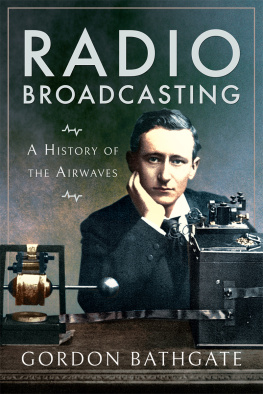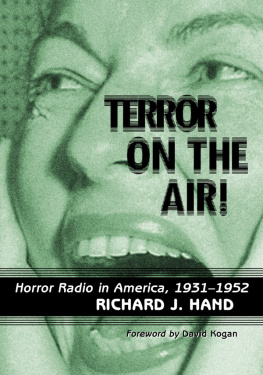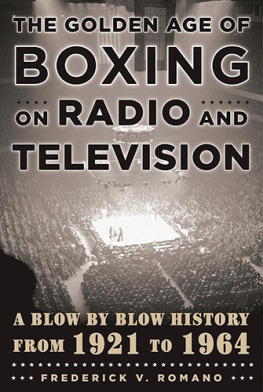Harcourt, Inc.
Orlando Austin New York San Diego London
A LSO BY A NTHONY R UDEL
Tales from the Opera
Classical Music Top 40: Learn How to Listen to and
Appreciate the 40 Most Popular and Important Pieces
Imagining Don Giovanni
Copyright 2008 by Anthony Rudel
All rights reserved. No part of this publication may be reproduced
or transmitted in any form or by any means, electronic or mechanical,
including photocopy, recording, or any information storage and
retrieval system, without permission in writing from the publisher.
Requests for permission to make copies of any part of the
work should be submitted online at www.harcourt.com/contact
or mailed to the following address: Permissions Department,
Houghton Mifflin Harcourt Publishing Company,
6277 Sea Harbor Drive, Orlando, Florida 32887-6777.
www.HarcourtBooks.com
Library of Congress Cataloging-in-Publication Data
Rudel, Anthony J.
Hello, everybody!: the dawn of American radio/
Anthony Rudel.1st ed.
p. cm.
Includes bibliographical references.
1. Radio broadcastingUnited StatesHistory20th century.
I. Title.
PN1991.3.U6R83 2008
384.540973'0904dc22 2008005629
ISBN 978-0-15-101275-6
Text set in Bembo
Designed by Lydia D'moch
Printed in the United States of America
First edition
A C E G I K J H F D B
For all the dedicated broadcasters
who make American media so incredibly vibrant,
AND
to my wonderful familywith love
and thanks for your patience.
Chapter 1
M ILFORD, K ANSAS. Population 200not counting animals.
At the beginning of the twentieth century, Milford, Kansas, was a one-horse town on the western plains; there were no paved roads, no sewers, no water system, no high schools, and no sidewalks. Situated across the river and one mile down a dirt road from the nearest train depot, Milford happened to be located about ten miles from the geographical center of the United States. Its other claim to fame was that amid the town's rows of dilapidated structures there was one lone architectural curiosity: a building that had been transported from the 1906 St. Louis World's Fair after the fair had closed. Located on the Republican River, which flows to Junction City, the county seat of Geary County, Milford was near the godforsaken spot of land from where Horace Greeley had been inspired to report that the buffalo hurried through the region, "as I should urgently advise them to do."
But Milford's rise to national fameor infamywould really begin in October 1917, when late one evening, the town's new and only doctor welcomed a patient to his neat, simple office. Perhaps the man, a local rancher, was put at ease by the official-looking framed diploma from the Eclectic Medical University of Kansas that hung on the wall; or maybe the fact that the doctor and his wife owned the adjoining apothecary and soda fountain, with its neatly appointed shelves of vials and bottles, filled the rancher with confidence; or maybe the doctor's affable manner and his distinguished red Vandyke assured the new patient that he'd found someone in whom he could confide. Whatever the reason, the man eventually worked his way around to telling the doctor about his real problem.
"Doctor," he said, "I'm forty-six. I've got a flat tire. I'm all in. No pep."
Today an entire pharmaceutical industry has grown around the problem we so loosely call erectile dysfunction, but in the early twentieth century the condition, so vividly described as a "flat tire," was known in polite circles as "lassitude."
The doctor, whose medical experience came primarily from earlier, nomadic years staying one step ahead of the law while working with other quacks, medicine shows, and anatomical museums, was unable to offer much encouragement. Depressed, the rancher talked enviously about his well-endowed goats and their prodigious sexual athleticism.
"Yep," the doctor chuckled. "You wouldn't have any trouble if you had a pair of those buck glands in you."
Intrigued by the idea, and perhaps willing to do anything to ante up the randy factor, the rancher eagerly pressed his case.
The rancher stared intently into the doctor's eyes and enthused, "Well, why don't you put 'em in me?"
And with the breezy air of a man who had nothing to lose, Dr. John Romulus Brinkley, emboldened by the purchased medical degree tacked to his office wall, assented. In one of the more unlikely transplants of the era, by one of the more unlikely medical professionals, Dr. Brinkley, using one of the rancher's own goats as the donor, implanted tissues from the poor animal.
Within two months the rancher was boasting all over town about his resurrected prowess, and other local men who found themselves in the same predicament made their way to Dr. Brinkley's. Among the earliest patients was one William Stittsworth, whose wife gave birth one year later to a healthy son whom they named Billy in honor of the generous donor goat.
Although the procedure was filmed and real medical specialists were later invited to observe the magical rejuvenation surgery that Brinkley called his "Compound Operation," the exact surgical methods and procedures were never completely memorialized. However, Brinkley, who proudly proclaimed he was the first man to take a goat's testicle and implant it in a man, described his operation this way:
The glands of a three weeks' old male goat are laid upon the non-functioning glands of a man, within twenty minutes of the time they are removed from the goat. In some cases I open the human gland and lay the tissue of the goat within the human gland. The scrotum of the man is opened by incision on both sides ... I find that after being properly connected these goat glands do actually feed, grow into, and become absorbed by the human glands, and the man is renewed in his physical and mental vigor.
In actuality, Brinkley probably did not operate on the patient's testes, but somewhere higher up in the anatomy. The rejuvenation his patients discovered was likely due to psychological factors; just the idea that they had newfound vigor probably allowed them to relax and again become sexually active.
It was sensational. Dr. Brinkley was the talk of Milford, and soon enough, word of the surgery spread and men of all ages from the small towns and villages of the surrounding Kansas countryside were streaming into town, seeking the special surgery by the great man who could reinflate their flat tire: Dr. John Romulus Brinkley. The cost per operation was between $500 and $750, and that included the necessary goat tissue, which was purchased from local ranchers.
D UE TO HIS OWN vague and conflicting rewrites of his personal history, John Romulus Brinkley's years of learning, traveling, and avoiding arrest that brought him to Milford are imprecise. What is certain is that he was born on July 8, 1885, in the Great Smoky Mountains, and that even though his father was the local doctor, his family was poor.
After completing whatever formal education was available in his rural community, Brinkley got a jobwith no payat the railroad office in Sylva, North Carolina. There the manager taught his young charge how to operate the telegraph, and Brinkley became intrigued by the machine's ability to exchange information with people somewhere on the other side of the mountains. Communicating with an invisible audience was addictive. Brinkley wanted more from life than what was available in this rural world, so he set his sights on becoming a doctor and getting out of the kind of backwoods world into which he'd been born. In 1907 he married and began a career as a "Quaker doctor," which was a cross between a somewhat respected medical authority and a vaudeville showman. This position yielded a platform from which a quick talker who had gained the audience's confidence might convince the crowd of the special curative powers of the liquids and herbs he sold. He may have been called a Quaker doctor, but in truth Brinkley was nothing more than a classic snake-oil pitchman, and his talent for fast talk would play a significant role in his later success as a radio pioneer and broadcaster.
Next page









